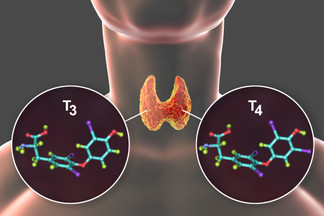Posted by Dee Cee Labs on Apr 3rd 2025
Hormone Balance and Nutrition: How Diet Affects Cortisol and Thyroid Function
Hormones are the body’s chemical messengers, and when they’re out of balance, everything from mood to metabolism can be affected. Two key hormones—cortisol and thyroid hormones—play major roles in energy regulation, stress response, and overall vitality. Nutrition has a profound impact on how these hormones function, and chiropractors can support their patients’ health by recognizing the diet-hormone connection.
Cortisol: The Stress Hormone
Cortisol is produced by the adrenal glands and helps regulate blood sugar, inflammation, and the body’s response to stress. But chronic stress and poor dietary habits can lead to elevated cortisol levels, which over time may cause:
-
Fatigue or “burnout”
-
Difficulty sleeping
-
Blood sugar imbalances
-
Weight gain (especially around the midsection)
-
Suppressed immune function
Nutritional strategies to support healthy cortisol levels include eating protein-rich meals throughout the day, reducing refined sugars, and including magnesium-rich foods like leafy greens and seeds. Adaptogens like ashwagandha and rhodiola can also help balance the body’s stress response naturally.
Thyroid Function and Nutrient Deficiencies
The thyroid gland regulates metabolism, temperature, and energy levels. For proper hormone production, it needs key nutrients like:
-
Iodine – essential for thyroid hormone synthesis
-
Selenium – helps convert T4 (inactive) to T3 (active) hormone
-
Zinc and iron – support thyroid hormone production and transport
-
Tyrosine – an amino acid that serves as a building block for thyroid hormones
A diet low in these nutrients—or high in processed, inflammatory foods—can impair thyroid function and contribute to symptoms like fatigue, weight gain, cold intolerance, and brain fog. These supplements can be shopped with us as Dee Cee Laboratories.
Balancing Hormones Through Diet and Supplementation
Incorporating a whole-foods-based, anti-inflammatory diet that includes lean proteins, healthy fats, complex carbs, and plenty of micronutrients is foundational for hormone balance. When nutrient gaps exist, targeted supplementation may help restore hormonal harmony.
For chiropractors supporting patients with chronic fatigue, stress-related issues, or sluggish metabolism, understanding the impact of nutrition on hormone function is key to a comprehensive care plan. Encouraging dietary changes alongside chiropractic adjustments can help patients regain balance, energy, and long-term wellness.

